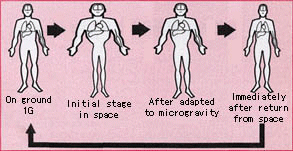|
Astronauts returning to Earth sometimes feel
light-headed. It's been a problem since the earliest days of human
space exploration, but now doctors may have a solution.
by Doug Hullander and Dr Tony
Phillips
Landing a spaceship is a terrible time
to feel dizzy, yet that's what happens to some astronauts. Their
legs become heavy and their heads light even as the planet below
expands to fill the windshield. It's an unwelcome side-effect of
returning home.
Researchers have learned that the sensation
is caused, in part, by orthostatic hypotension - "in other words,
a temporary drop in blood pressure," explains NASA Chief Medical
Officer Rich Williams. On Earth you can feel it by standing
or sitting up too fast. Gravity has much the same effect on astronauts
returning from a long spell in space: Blood rushes down and the
space travelers become, literally, lightheaded.
Susceptibility is highly individual. Some
astronauts are hardly affected while others feel very dizzy: About
20% of short-duration and 83% of long-duration space travelers experience
the symptoms during re-entry or after they land.
"Cosmonauts who spent a long time onboard Mir commonly
had to be carried away in stretchers when they came home," recalls
Williams. Fortunately, their Soyuz return capsules did not require
a pilot to land, so it didn't matter much. Shuttle pilots, on the
other hand, must perform complex re-entry procedures. To them it
matters a great deal.
Orthostatic hypotension can strike Earth-dwellers
for many reasons: Weak hearts might not pump enough blood, for example.
Certain medications or even a hot shower can dilate blood vessels
and cause blood pressure to drop. Women - especially pregnant women
- are more likely to suffer from it than men. "Some patients with
this condition are afraid to leave home or even get out of bed,"
writes neurologist Phillip Low of the Mayo Clinic.

more
Fluid shifts
caused by space flight. From "The Bone"(Vol. 11 No.2 1997.6)
Medical View Co., Ltd.
|
Astronauts experience orthostatic hypotension
because of the way human bodies respond to gravity, explains Richard
Cohen of the Harvard-MIT Division of Health Sciences and Technology.
(Cohen leads the Cardiovascular Alterations Team at the National
Space Biomedical Research Institute, or "NSBRI.") On Earth gravity
pulls blood toward the lower body. But in space - either in free-fall
or far from a source of gravity - blood that normally pools in
the legs collects in the upper body instead. That's why astronauts
have puffy-looking faces and spindly "chicken legs."
Astronauts don't feel orthostatic hypotension
while they're traveling through space, but they do begin to feel
it during re-entry (when g-forces mimic gravity) and after landing.
Blood returns to the lower body and blood pressure to the head is
suddenly reduced. Hence the dizziness. (The sensation can continue
for a while after landing, too.)

Grey's
Anatomy
Muscles in
the veins of the legs help force back uphill toward the heart
|
It's a classic case of "use it or lose
it." Veins in human legs contain tiny muscles that contract when
the veins fill with blood. Their function is to send blood uphill
toward the heart and so maintain blood pressure. But in space there
is no "uphill," so those tiny muscles in the veins are less-used
- a normal adaptation to weightlessness.
During re-entry those muscles are needed
again, but they have temporarily "forgotten" how to contract. They
fail to push blood back toward the heart and brain. "This effect
is more severe after prolonged space flights," notes Cohen.
For many years astronauts have tried
to counteract orthostatic hypotension by drinking lots of salt water,
which increases the volume of bodily fluids.(There is a general
loss of body fluids during space missions.) Astronauts also wear
"G-suits" - rubberised full-body suits that can be inflated with
air. This action squeezes the extremities and raises blood pressure.
Such countermeasures are only partially
effective. "Almost all returning astronauts experience changes in
gait and balance," continues Williams. Nevertheless, "most are able
to walk around just fine. A small number experience orthostatic
changes that render them quite dizzy."
An anti-dizzy pill would be helpful,
but until recently there was no such thing.
Enter Midodrine: Midodrine is the first
drug approved by the United States Food and Drug Administration
to treat orthostatic hypotension. It constricts blood vessels and
so increases blood pressure. "By increasing blood pressure when
patients need it, Midodrine can help people lead a more normal life,"
writes Low.
Cohen thinks it might help astronauts,
too.

Expedition
Four
ISS crew members
will soon participate in tests of Midodrine. Pictured here
is the crew of the ISS Expedition Four
|
Cohen works with Janice Neck, head
of the Cardiovascular Lab at NASA's Johnson Space Centre, and Gordon
Williams, a doctor at the Brigham and Woman's' hospital in Boston,
to study adverse effects of space flight on the human cardiovascular
system. Following animal studies and computer simulations (performed
by members of the NSBRI Cardiovascular Alterations Team), they conducted
bed-rest testing of real humans - a situation that simulates the
effect of space travel on the cardiovascular system. Astronauts,
they concluded, would likely benefit from the drug.
An important advantage to Midodrine,
says Cohen, is that it can be administered just before re-entry
or even after landing. The benefits are immediate. Astronauts wouldn't
have to take it throughout their mission when it might interfere
with their body's own (and welcome) adaptations to zero-g.
"A flight study protocol has been approved
to test the drug's effects on space shuttle astronauts and ISS crew
members," says Cohen.
Perhaps soon astronauts returning home
from space will feel lightheaded - but only due to elation. Orthostatic
hypotension will have nothing to do with it.
|
